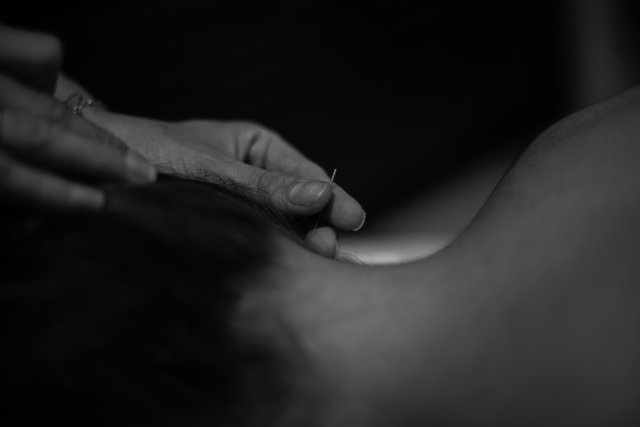Can Acupuncture Help my Headache?
Did you wake up with a headache this morning? Or go to bed with one last night? Well it turns out you are not alone. Headaches are actually the most common symptom experienced by humans so would be very unusual if you did not experience at least an occasional headache. This, by no means, means that they aren’t painful and disruptive to everyday life and that you just need to accept them. Before we get into ways to decrease the occurrence and severity of headaches and other possible treatment options, let’s look at the types and potential causes of headaches.
Firstly, I think it’s important to give a brief explanation of the difference between migraines and headaches. As a general description, headaches are just that, an ache in the head, which are not usually accompanied by other symptoms. Migraines, on the other hand, are usually experienced as a headache that occur with other symptoms such as vomiting, nausea and sensitivity to light and noise. Physical activity can make the migraine worse and the attacks usually last from 4 to 72 hours. There are also certain triggers involved in setting off a migraine in those people that are predisposed to them, such as lifestyle choices and hormonal changes.
Excellent, now that we know the difference between migraines and headaches we can move onto the wide world of the various types of headaches. The list is surprisingly long! Here we go…
Allergy headaches: Headaches that are commonly accompanied by nasal congestion and watery eyes
Arthritis headaches: Pain at the back of head or neck which intensifies on movement. It is caused by inflammation of the blood vessels of the head or bony changes in the structures of the neck
Caffeine-withdrawal headaches: I know I have definitely experienced this type! It is normally a throbbing headache which is caused by rebound dilation of the blood vessels, occurring multiple days after consumption of large quantities of caffeine
Chronic daily headaches: Refers to a broad range of headache disorders occurring more than 15 days a month
Cluster headaches: Excruciating pain in the area of the eye. It is accompanied by tearing of the eye, nasal congestion, and flushing of the face. Pain frequently develops during sleep and can last for several hours
Eye strain headaches: Usually frontal, bilateral pain directly related to eyestrain
Exertion headaches: Generalised head pain of short duration during or following physical or passive exertion
Fever headaches: Generalised head pain that develops with fever and is caused by the swelling of the blood vessels of the head
Hangover headaches: Arguably one of the worst headaches, mostly because we know it is self-inflicted. It can present with migraine-like symptoms of throbbing pain and nausea, but it is not localised to one side. Obviously it is precipitated by over-indulgence in alcohol
Hunger headaches: Pain strikes just before mealtime. It is caused by muscle tension, low blood sugar, and rebound dilation of the blood vessels, oversleeping, or missing a meal
Hypertension headaches: Generalised or “hairband” type pain that is most severe in the morning. It diminishes throughout the day
Menstrual headaches: Migraine-type pain that occurs shortly before, during, or immediately after menstruation or at mid-cycle (at time of ovulation)
New daily persistent headaches: Best described as the rapid development (less than three days) of unrelenting headache
Post-traumatic headaches: Localised or generalised pain, can mimic migraine or tension-type headache symptoms. Headaches usually occur on daily basis and are frequently resistant to treatment
Sinus headaches: Gnawing pain over nasal area, often increasing in severity throughout day. Pain is caused by acute infection, usually with fever, producing blockage of sinus ducts and preventing normal drainage
Temporomandibular Joint Headaches: A muscle-contraction type of pain, sometimes accompanied by a painful “clicking” sound on opening of the jaw
Tension-type headache: Dull, non-throbbing pain, frequently bilateral, associated with tightness of scalp or neck
Tumour headache: Pain progressively worsens; projectile vomiting; possible visual disturbances speech or personality changes; problems with equilibrium; gait, or coordination; seizures. Please note that it is an extremely rare condition

Computer induced headache
Believe it or not but this isn’t actually a complete list! My research found over 36 different types of headaches, which ranged from MSG headaches to aneurysms.
Phew, I’m glad that’s out of the way, we can now move onto the fun stuff! And by fun stuff I mean potential treatment options. One of the first things I always look at is a person’s lifestyle and dietary choices. Lifestyle factors and food choices play a huge role in our overall health and with our high stress lives, coupled with diets that tend to be high in processed foods, it's no wonder we experience a medley of health complaints. Here are a few simple suggestions to begin with:
Keep a headache diary – Noticing that you get a headache at the same time every day? Or that you get a headache after eating that delicious Chinese food? Keeping a diary will help to join the dots between lifestyle choices and what triggers your headache
Take note of your stress levels – Stress is a surprisingly common cause of headaches. Consider adding regular exercise, yoga and/or meditation to your routine and see if your headaches decrease
Avoid foods that trigger your headaches – An article published in The Clinical Journal of Pain suggested that certain subsets of patients may be sensitive to phenylethylamine, tyramine, aspartame, monosodium glutamate, nitrates, nitrites, alcohol, and caffeine
Sleeping too much or not getting enough? – Ensure you are getting enough sleep each night and try to go to bed around the same time
Certain supplements may also assist in the reducing headaches as well. These include:
Magnesium: According to some studies, people who experience headaches often have lower levels of magnesium. One study in particular found that people who took magnesium experienced a reduction in the frequency of attacks by 41.6%, compared to 15.8% in those who took the placebo
Coenzyme Q10: Preliminary research indicates that CoQ10 may help prevent migraines, although more research is needed
Riboflavin: Also known as vitamin B2. More research needs to be conducted regarding the intake of riboflavin in the treatment of headaches, however one particular study found that people who took riboflavin had more than a 50% decrease in the number of attacks
Alpha lipoic acid: In a small double-blind trial, people that took alpha-lipoic acid experienced a significant reduction in the frequency of migraine attacks
Always, always, always consult a professional before starting on any supplement regime as they can have interactions with prescribed medications. Very important to remember!
Moving on to my favourite topic. Acupuncture! Personally, I think acupuncture is great for almost anything, but it is especially great for the treatment of headaches. Acupuncture has been used to treat headaches for thousands of years (I’m actually not kidding). I find that one of the major benefits acupuncture has over western treatment is that it has virtually no side effects (unlike synthetic drugs) and the procedures are much less invasive.
And now for my very last trick… Acupuncture research! There is a large body of research out there regarding acupuncture in the treatment of headaches. Due to the varying nature of headaches, it is difficult to find a general study on acupuncture treatments for the broad banner term of ‘headaches’. I did, however, discover a statement made by a Cochcrane review*, which stated “The available evidence suggests that a course of acupuncture consisting of at least six treatment sessions can be a valuable option for people with frequent tension-type headache.” The author also concluded that acupuncture is effective for treating frequent episodic or chronic tension-type headaches but further trials are needed. More trials that compare acupuncture to other treatment methods would be ideal.

This acupuncture point can be used for headaches
As always, I suggest making an appointment with your health practitioner to discuss your health goals and what you seek to achieve from treatment. Making lifestyle and dietary changes can be confusing if you aren't sure where to start, so make an appointment with your local, registered acupuncturist and they can help you to simplify the process and support you on your journey to good health.
Written by
Jacinta Eales
BHSc (Acu)
*Cochcrane reviews are systematic reviews of primary research in human health care and health policy, and are internationally recognised as the highest standard in evidence-based health care resources. They investigate the effects of interventions for prevention, treatment, and rehabilitation.
Disclaimer: Obviously, I am an Acupuncturist, so this blog reflects my own personal opinions and research. This blog should in no way be used as a means to self diagnose and it is my responsibility as a health practitioner to recommend that you seek out a professional who is legally qualified to diagnose your condition.
References
- Headache Australia. (2016). Prevalence and Cost Of Headache - Headache Australia. [online] Available at: http://headacheaustralia.org.au/what-is-headache/prevalence-and-cost-of-headache/ [Accessed 28 Aug. 2016].
- The Migraine Trust. (2016). Headache - The Migraine Trust. [online] Available at: https://www.migrainetrust.org/about-migraine/types-of-migraine/other-headache-disorders/headache/ [Accessed 28 Aug. 2016].
- National Headache Foundation. (2008). The Complete Headache Chart | National Headache Foundation. [online] Available at: http://www.headaches.org/2008/12/11/the-complete-headache-chart/ [Accessed 28 Aug. 2016].
- Headache Australia. (2016). Headache Management - Headache Australia. [online] Available at: http://headacheaustralia.org.au/headache-management/ [Accessed 29 Aug. 2016].
- National Headache Foundation. (2016). Headache Sufferer's Diet | National Headache Foundation. [online] Available at: http://www.headaches.org/headache-sufferers-diet/ [Accessed 29 Aug. 2016].
- A, S. (2016). Foods and supplements in the management of migraine headaches. - PubMed - NCBI. [online] Ncbi.nlm.nih.gov. Available at: http://www.ncbi.nlm.nih.gov/pubmed/19454881 [Accessed 29 Aug. 2016].
- University of Maryland Medical Center. (2016). Migraine headache. [online] Available at: http://umm.edu/health/medical/altmed/condition/migraine-headache [Accessed 29 Aug. 2016].
- Uofmhealth.org. (2016). Alpha Lipoic Acid | University of Michigan Health System. [online] Available at: http://www.uofmhealth.org/health-library/hn-2799001 [Accessed 29 Aug. 2016].
- Acupuncture.org.uk. (2016). Headache. [online] Available at: http://www.acupuncture.org.uk/a-to-z-of-conditions/a-to-z-of-conditions/headache.html [Accessed 29 Aug. 2016].
My dad always said I get head aches cause I have an ugly head.....:-)
Great info and brilliantly referenced.
Cheers Briz :) haha I wondering what references he was basing his conclusion on....
The reference of looking at my head everyday i guess.......
Very informative! Thanks for all the info on the headache that is headaches :)
Thanks! I'm surprised by how many people think regular headaches are just a way of life. Insane
So, which type of headaches do you find acupuncture helps with the most? I assume because there are different causes/triggers and different ways to manage them that acupuncture fits in there somewhere but I am not quite sure where. It'd be great if you can explain it in a bit more details :)
Acupuncture can usually have some effect on all types of headaches, including migraines. I find tension type headaches respond the best to acupuncture but it usually depends on the individual, how long they have had the headache for, history of headaches etc etc.
Acupuncture stimulates the release of adenosine which is a neurotransmitter. It is an inhibitory neurotransmitter which means it can depress the CNS and promote sleep (often why people feel sleepy during and after a treatment) which is one of the ways acupuncture can help tension type/stress induced headaches. Adenosine also plays a role in stimulating the release of endogenous opioids (the body's natural painkillers).
I hope that gives you a little more insight! :)
Sure does. I wouldn't want to get the false impression that acupuncture was a cure for any types of pain :p